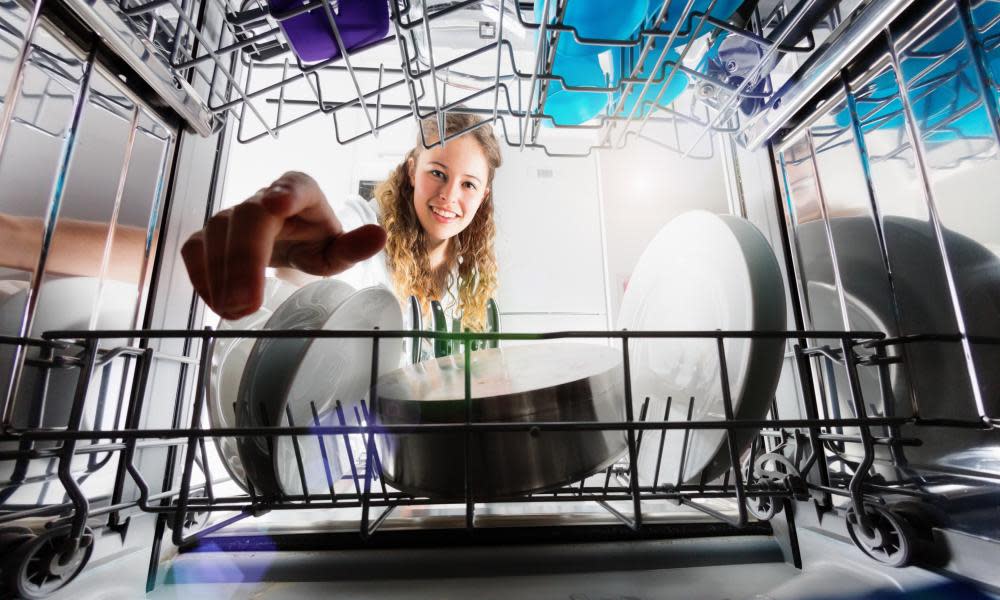How to properly load a dishwasher: 'If you pre-rinse it might actually come out dirtier'

If you still feel the sting of parental reprimands for barbarically stacking your plate in the dishwasher without rinsing it first, one good thing 2020 can offer is vindication. While everyone has their own methods, tricks and opinions on conventional wisdom, the misinformation around a machine that’s meant to make our lives easier has caused generations-long feuds – and water wastage.
Fact: You do not need to pre-rinse. Just scrape the solids into the bin, says Ashley Iredale, white goods expert at the independent consumer advocacy group Choice. Most dishwashers have inbuilt turbidity sensors that measure how much dirt is in the water from the first rinse cycle, so rinsed plates may fool the system. “If you pre-rinse everything, your dishwasher’s going to think that your plates are cleaner than they actually are, so it won’t wash as intensely and they might actually come out dirtier,” says Iredale. The food filter is there for a reason, he adds – simply remove and clean it once a month.
Related: Share a kit or bring your own plate: tips for throwing a zero-waste party
The most powerful jets in a dishwasher shoot upwards from the bottom, so stack the dirtiest items on the lower shelf and the cleaner or more fragile items above. This is also why your bowls, containers and cutlery should face down.
A full dishwasher dries better than a half-full dishwasher. “The dishwasher dries by using the final rinse cycle to build up a heat load in your plates, and then it just sits there for a while and … the moisture will evaporate,” Iredale explains. Plastics have a much lower thermal mass than ceramics, so if you’re doing a load of tupperware, you may want to crank the temperature to help them dry.
Without the force of mechanical scrubbing, or the abrasion of dish brushes, dishwashers need to be savage and inhospitable to get the job done. “It’s heat, water and chemicals,” Iredale says. “Dishwashing liquid’s pH is 10.5 to 12.5 … water is pH7, and oven cleaner is pH12.5 to 13.5, so it’s pretty nasty stuff. You really don’t want to get it on your hands.”
Unlike dishwashing liquid for your sink, dishwasher detergents are abrasive – like toothpaste – to chip away at food particles. The cloudy film on your glassware is actually a lot of tiny, permanent scratches.
Many materials won’t withstand a high-pH hurricane every night. “A good rule of thumb is anything that predates the dishwasher shouldn’t go in one,” Iredale says.
Anything fragile, handmade or hand-painted should be left out. The same goes for wood, bone, copper, pewter, cast-iron, and non-stick coated pans and trays. Anything laminate can warp; anything glued can come unstuck; chefs’ knives will rust and dull; and lead can activate and leach out of lead crystal glasses.
The dishwasher is this wonderful thing but it ... took away the intuition of doing the dishes
Peter Miller
Despite all the caveats, dishwashers are not only the convenient answer to our modernist woes, they’re actually more energy- and water-efficient than hand washing. A full dishwasher can clean 144 items with roughly 13 litres of water, or anything between eight and 20. According to a study by the University of Bonn, hand washing the same load uses, on average, 100 litres of water.
“Most of the energy that goes into running your dishwasher is actually heating the water, and it’s the same for hand washing, so much less water [in dishwashing] means much less energy,” Iredale says.
But to Peter Miller, the “Marie Kondo of dishwashing” and author of How to Do the Dishes, efficiency and convenience aren’t everything.
The hand washing enthusiast says the best way to know if something’s clean is to take your time to look at it and feel it. You’ll know immediately if something’s dirty when you run your fingers along the surface.
“The dishwasher is this wonderful thing but it did, in truth, produce a kind of idiot-worker in the kitchen because it took away the intuition of doing the dishes,” he tells Guardian Australia from his home in Seattle. “I want to get my hands on the thing, [like] cooking is getting your hands on what you’re doing.”
By paying as much care and attention to cleaning as we do cooking, he says, washing dishes mindfully can bring a lot of joy, and even make you a better cook. “You get a little review; you’re backstage and you see exactly … how the broccoli did, you see how the fish did, you see whether the salad was too wet or too dry.”
While researching for his book, Miller noticed that people generally like to remove themselves from the table to autocratically get the cleaning over and done with and “make the problem go away”.
But at festive occasions sharing the washing up can invite some of the most treasured, genuine interactions, and be an opportunity to change the scene, pace, topic, mood or even conversation partner. “If it’s a holiday, it helps to move around a bit, and I just think there’s some spirit to it.”


